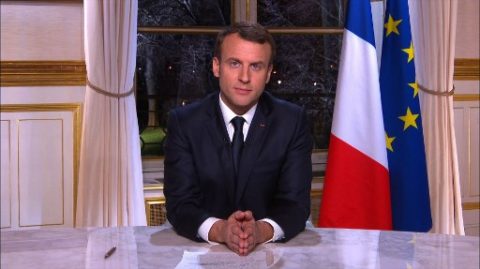
PARIS, France (AFP) — French President Emmanuel Macron Tuesday expressed his concern over unrest in Iran during a telephone conversation with counterpart Hassan Rouhani and called for “restraint and appeasement,” his office said.
Macron brought up “the number of victims from the demonstrations,” and the two leaders also decided to postpone French Foreign Minister Jean-Yves Le Drian’s visit to Tehran this week to a later date, the Elysee said.
The two leaders’ conversation came after nearly a week of protests in Iran marked by deadly violence and hundreds of arrests.
Macron’s office said the French leader underscored that “fundamental rights including freedom of expression and freedom to demonstrate must be respected.”
Rouhani in turn asked Macron to take action against a Paris-based Iranian opposition group called the Mujahedeen-e-Khalq (the People’s Mojahedin Organization of Iran, PMOI), which he accused of fomenting the recent protests.
“We criticize the fact that a terrorist group has a base in France and acts against the Iranian people… and we await action from the French government against this terrorist group,” Rouhani told Macron, according to a report on Iranian state television.
Tehran accuses the PMOI of fuelling the violence and being linked to its Saudi rivals.
In a statement sent to AFP in Paris by Afchine Alavi, of the National Council of the Iranian Resistance, PMOI said “to date, there are dozens of defenceless protesters killed by Revolutionary Guards and thousands more arrested,” without giving sources.
Tehran’s remarks reflect the “panic of the mullahs’ regime in the face of the extent of the uprising against the religious dictatorship and the growing popularity of the People’s Mojahedin Organization of Iran (PMOI) and the Iranian Resistance,” the statement said.
According to official figures, 21 people have died since the start of the protests on December 28 in the northeast city of Mashhad.
Macron’s office did not mention the opposition group’s presence in France.
It said the two leaders had evoked the 2015 nuclear accord, with the French president wanting its “strict application under international supervision,” while Rouhani sought “the backing of the international community to defend this accord and respect the commitments undertaken.”
President Donald Trump has hinted of a possible US withdrawal from the nuclear deal between Iran and six world powers — Britain, China, France, Germany, Russia and the United States — that was a signature foreign policy achievement of the administration of his predecessor Barack Obama.
General Rassul Sanairad, a political deputy to the head of Iran’s powerful Revolutionary Guards, said Tuesday the Mujahedeen-e-Khalq had been instructed by the Saudi rulers and some European states to “create insecurity” in Iran, Tasnim news agency reported.
© Agence France-Presse








